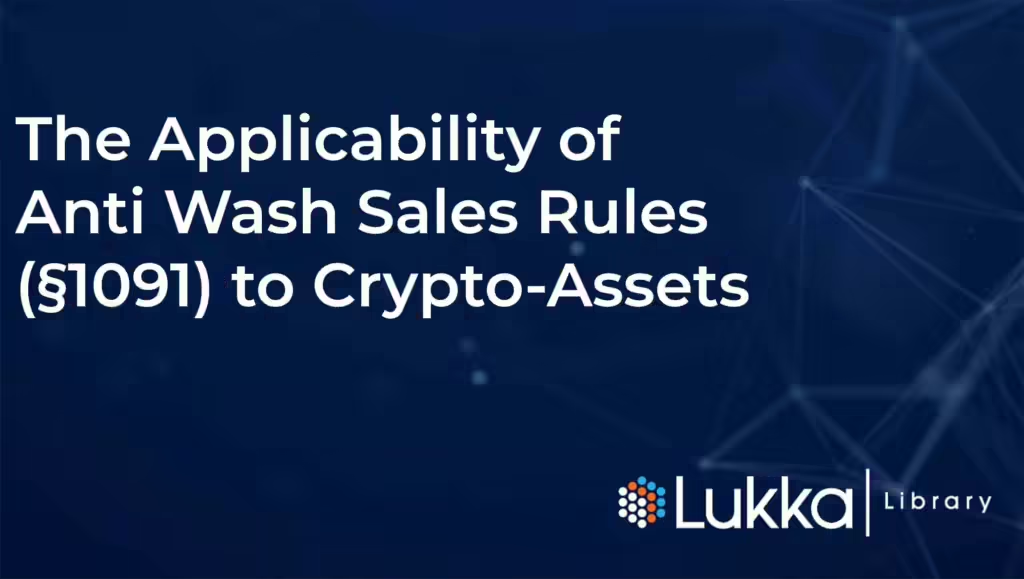Author: Omri Marian
Omri Marian is a Professor of Law and the Academic Director of the Graduate Tax Program at the University of California, Irvine, School of Law.
This document is intended for informational purposes only. This document not intended to serve as legal, tax or any other advice. Tax consequences of a transaction are dependent on the particular facts and circumstance of the transaction, and the general discussion of the legal principles herein does not seek to give guidance on a taxpayer’s particular circumstances. Readers should consult their own tax advisor for the applicability of the rules discussed to them. There is no specific guidance specifically addressing the issues discussed, and courts and the IRS may take a different legal positions than those expressed by the author.
******
I. Introduction
Section 1091 of the Internal Revenue Code (IRC), is an anti-abuse rule aimed at curtailing tax schemes associated with “Wash Sales.” Generally, wash sales are intended to trigger losses for tax purposes, without materially changing the taxpayer financial position. Most commonly, this can be achieved by selling a financial asset with a built-in loss, and immediately repurchasing it at a price identical, or very close to the sales price. Alternatively, one could sell an asset and enter into forward contract to purchase the asset, or purchase a call option with respect to the asset.
Section 1091 prevents such practices by disallowance of a loss sustained on the “disposition of shares of stock or securities”, where “the taxpayer has acquired…,or has entered into a contract or option so to acquire, substantially identical stock or securities” during a period beginning 30 days before the disposition and ending 30 days the disposition.1 If a loss is denied under this rule, the basis in the loss asset is added to the basis of the purchased substitute asset. That way, the loss is not completely denied, but deferred until disposition of the substitute asset.2
In addition, the holding period from the wash sale asset is transferred to the substitute asset.3 This rule aims to make sure that selling the substitute assets would result in the same tax consequences that would result from the sale of the original asset, as if the original has never been disposed of in the wash sale. This also prevents taxpayers from converting long-term capital losses (that would result from the sale of a long-held original loss asset), to short-term capital gains (from selling the substitute asset with a transferred basis a short time after its acquisition).
Dealers in stock or securities are exempt from the wash sales rules if the transaction made in the ordinary course their business.
II. The Applicability of the Wash Sales Rules to Crypto-Assets
Holders of crypto-assets with a built-in loss may consider selling and immediately repurchasing their assets in order to trigger loss for tax purposes. However, if Section 1091 covers crypto-assets, such strategies would be moot. Unfortunately, it is not clear whether Section 1091 applies to crypto-assets. By its language, Section 1091 only covers transactions in “shares of stock or securities”, or contracts or options in respect thereof.
Crypto assets as shares of stock.
While it is clear that crypto-assets are not themselves “shares of stock”, crypto assets may nonetheless be “contracts” in respect of “share of stock”. For example, digital tokens that represent equity interest, or are convertible to stock or other traditional securities, are possibly covered by Section 1091’s Wash Sales rules.4
Crypto assets as securities.
The more difficult issue, however, is whether crypto-assets are “securities” for Section 1091 purposes. The term “securities” in not defined for purposes of the wash sales rules. Courts, however, have generally been reluctant to read the term “securities” in an expansive manner in this context. For example, the original version of the Wash Sale rules only applied to stock or securities, not to options and contracts in respect thereof. The 8th Circuit denied an IRS invitation to apply the wash sales rules to stock options,5 which in turn attracted a Congressional response to amend Section 1091 explicitly cover contracts and options.6
Given the definitional uncertainty, the IRS has looked to other Code provisions as guidance. For example, in Rev. Rul. 74-218, the IRS determined that foreign currencies were not securities for Section 1091 purposes, partly justifying its conclusion by reference to Section 1236(c), which defines “security” as “any share of stock in any corporation, certificate of stock or interest in any corporation, note, bond, debenture, or evidence of indebtedness, or any evidence of an interest in or right to subscribe to or purchase any of the foregoing.” It does not seem that crypto-assets would meet such definition.
Court and the IRS have also been quite consistent in determining that foreign currencies, as well commodity futures are not “securities” for purposes of Section 1091.7 The exclusion of foreign currencies from the Wash Sale rules offers little solace to owners of crypto-assets, since the IRS explicitly declined to treated cryptocurrencies as foreign currencies for tax purposes.8 The exclusion of commodities, however, may be meaningful. If a crypto-asset qualifies as a commodity, then the asset, and any contracts or options in respect thereof, should not be subject to Section 1091.
Again, the IRS has not issued any guidance on whether certain crypto-assets are “commodities” for tax purposes.9 In at least one case, however, the IRS suggested that the term includes “all products that are traded in and listed on commodity exchanges located in the United States”.10 This suggests that future contracts in respect of certain crypto-assets, such as bitcoin futures traded on the Chicago Mercantile Exchange, should not trigger Section 1091. In addition, the CFTC opined that certain cryptocurrencies are commodities11, and at least one court approved such interpretation.12 While CFTC definitions are not necessarily dispositive for tax purposes in all instances, such determinations add weight to the argument that actively traded cryptocurrencies, and particularly future contracts that are traded on commodities exchanges, should be viewed as “commodities” for tax purposes, and as such are not subject to the Wash Sales rules under current IRS interpretation.
Similarly, one may argue that any crypto-asset which represent an interest in a non-security (such as interest for future services or products) is also not subject to the Section 1091 rules, as it is not a contract with respect to security.
In the absence of further guidance, it seems that in most instances Section 1091 should not apply to transactions in crypto-assets. However, given the interpretative difficulties associate with the term “securities”, a close inspection of each particular situation is required, particularly in cases where a digital token may represent an interest in an underlying asset that would qualify as stock or other security for tax purposes.
******
1 IRC §1091(a).
2 IRC §1091(d).
3 IRC §1223(3).
4 See, General Counsel Memorandum 38369 (May 9, 1980) (concluding that since Treasury Bills are covered by the Wash Sales rules, so are future contracts in respect of Treasury Bills).
5 905 F.2d 241 (8th Cir. 1990)
6 Pub. L. No. 100-647, § 5075, 102 Stat. 3342, 3682 (1988).
7 Rev. Rul. 74-218 (1974) (ruling that foreign currencies are not securities for purposes of Section 1091); Smith v. Commissioner, 78 T.C. 350, 386 (1982) (“section 1091 has no application to the field of commodities futures trading”).
8 IRS Notice 2014-21, IRB 2014-16 (2014).
9 There are multiple code provisions for which such determination is relevant; such as Section 475, 1256 and others.
10 Rev. Rul. 73-158 (1973)
11 In the Matter of Coinflip, Inc., d/b/a Derivabit, and Francisco Riordan, CFTC Docket No. 15-29 (Sept. 17, 2015).
12 Commodity Futures Trading Comm’n v. McDonnell, 287 F. Supp. 3d 213, 218 (E.D.N.Y.), adhered to on denial of reconsideration, 321 F. Supp. 3d 366 (E.D.N.Y. 2018).



